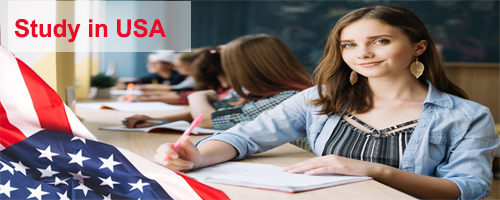USA Study Visa
The USA continues to be the top choice for students planning to study abroad. If you are among the few who aspire and have gotten the admission into your aspired university, applying for Student Visa is the next important step to realizing your Study in USA dream. This Students Visa Guide examines briefly the various types of visa and attempts to give a detailed process of applying for the F1 Student Visa – applicable to students planning to take up their bachelor ’s as well as master’s in USA.

Types Of Visa
There are three types of student visas to the US:
F1 Student Visa
- Students applying for a program which requires more than 18 hours of study in a week require an F1 visa. This includes all undergraduate programs as well as graduate programs like MS, MBA, etc.
- Spouses or children accompanying F-1 visa recipients will travel on an F-2 visa. Please note that spouses are not able to work but may accompany and/or apply for their own visa to the U.S. to work or study.
M-1 Vocational/ Non-Academic Student Visa
The M1 visa is a type of student visa reserved for vocational and technical schools. While the process remains similar to an F1 visa, the difference is that on entering, the M1 visas are time stamped and students cannot overstay their visit.
J1 Exchange Visitor Visa
The J-1 Exchange Visitor Visa is for students, visiting scholars or lecturers pursuing an exchange program. For example, Fulbright scholars and many students on short-term study abroad programs from Indian universities will travel to the U.S. on a J-1 visa.
J1 visa is usually sought by working professional who goes to America on an exchange program, hence the name Exchange Visitor Visa. These may include a 10-month vocational training or some research fellowship, etc. Whichever be the case, the applicants would be notified for the same by the respective institutions.
Spouses or children accompanying J-1 Visa recipients will travel on a J-2 Visa. Please note that spouses are able to work when permission is obtained in advance.
Working on Student Visa
During the first year of studies, students cannot accept off-campus employment. Students cannot work more than 20 hours per week. During holidays and breaks, the student may work up to 40 hours per week. The student can work for a commercial firm that provides services to the college, such as a bookstore or cafeteria.
There are two fees associated with for F1 student visa for the USA
- SEVIS fee which is at present at $200
- Visa Application Fee (MRV Fee) which is at present $160


Here is the breakdown of different types of Student Visas
| Type of Visa | |||
| Type of Fee | F1 | J1 | M1 |
| SEVIS Fee* | |||
| Amount | $200 | $180 | $200 |
| Accepted modes of Payment | Credit Card Money Order/ Demand Draft |
||
| Payable in | Dollars at the applicable exchange rate as determined by the bank | ||
| MRV Application Fee/ Visa Application Fee | |||
| Amount | $160 | $160 | $160 |
| Accepted modes of Payment | NEFT Online Transfer Instant Money Transfer by Mobile – IMPS By Cash at counters of Axis Bank/ Citibank |
||
*Spouses and dependents do not need to pay the SEVIS fee if they are going to the U.S. on F-2 or J-2 visas.
Documents Required for F1 Student Visa
Student visa requires you to carry a lot more documents than you would for a tourist visa, by comparison. You need the mandatory documents along with supporting documents of financial and academic records. Make sure you refer to this checklist before going to the consulate for the visa interview.
- Valid Passport
- Printed copy of DS-160, the online application form
- Interview appointment letter (original and copy)
- Form I-20 sent by the college
- Visa fees payment confirmation receipt
- Bank statement for at least three years showing that you have enough assets to pay for the first year (could be of parent or guardian)
- Pay slips
- Original mark sheets/provisional certificates
- Score sheet of exams like TOEFL, GMAT, IELTS, etc.


Supporting Financial Documents required for F1 Visa
For the USA, students need to show proof of the amount of fund they need to cover for the first year total expenses. It includes tuition fees, living expenses, and other expenses (like books). They also need to show the proof of the readily available funds for rest of the tenure of education.
Evidence of Financial Resources required for F1 Visa
- Tax returns for the past 3 years (Form 16)
- Bank statements/passbook for the past 3 years
- Original pay/salary slips and letters of employment
- Statement from certified CA
- Scholarship letter (If the applicant has received it)
- The loan approval letter by the bank or the concerned authority
Dependents
- Spouses and children under the age of 21 who wish to accompany the applicant in the US for the duration of his or her stay require F2 or M2 visas. A spouse on F2 status cannot enroll for a full course of study but can take classes that are vocational or recreational in nature like pursuing a hobby or interest, such as cooking or tennis. Children on F2 status are allowed to attend elementary, middle, or high school as a full-time student. They may not enroll in a full-time course of study at a college or university.
- The spouse and children of students cannot accept employment at any time during the stay-period on the F2 Visa.
Additional Information
F1 visa holders are eligible for up to 12 months of OPT (optional practical training) on completion of graduation. That means you can work for a year after you finish your studies. It is a temporary employment permission allowing students the opportunity to gain practical experience in their field of study. After that, you’ll be required to apply for a work visa if you have to continue working in the US. You can remain in the US up to 60 days after the completion of your course even if you don’t have a job offer or haven’t applied for OPT.
